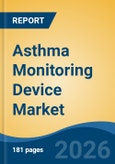Speak directly to the analyst to clarify any post sales queries you may have.
10% Free customizationThis report comes with 10% free customization, enabling you to add data that meets your specific business needs.
Despite this positive trajectory, the market faces significant hurdles due to the high costs associated with advanced digital monitoring systems and the lack of adequate reimbursement policies in emerging economies. Data from the Global Initiative for Asthma indicates that over 260 million people worldwide suffered from the disease in 2024, highlighting a critical need for affordable monitoring options. Currently, economic constraints prevent a substantial portion of this patient population from accessing modern technological aids, thereby limiting broader market penetration.
Market Drivers
The increasing prevalence of asthma and other chronic respiratory diseases acts as the central force propelling the monitoring device market, particularly in regions burdened by environmental issues. In 2024, the American Lung Association reported that roughly 131.2 million people in the United States resided in areas with unhealthy pollution levels, creating an urgent necessity for rigorous symptom tracking to mitigate health risks. Furthermore, the Asthma and Allergy Foundation of America's 'Asthma Capitals 2024 Report' revealed that nearly 28 million Americans are living with asthma, underscoring the immense scale of the demand for continuous home-based monitoring solutions.Parallel to this demand, technological innovation in smart inhalers and digital health platforms is revolutionizing the industry by enabling proactive, data-centric care. These modern devices integrate seamlessly with cloud systems to monitor medication adherence in real-time, greatly enhancing patient self-management. This trend is reflected in AstraZeneca's 2024 Annual Report, which noted a 23% revenue increase in their Respiratory & Immunology division, signaling strong industrial growth driven by the adoption of connected care ecosystems that reduce hospital readmissions and improve clinical decision-making.
Market Challenges
A primary obstacle restricting the growth of the Global Asthma Monitoring Device Market is the prohibitive cost of advanced digital monitoring systems combined with limited reimbursement frameworks. Although these technologies provide superior tracking capabilities, their high price points make them inaccessible to a large demographic, especially in emerging economies where patients often rely on out-of-pocket payments. Consequently, when faced with financial constraints, patients typically prioritize purchasing essential medications over acquiring supplementary monitoring tools, effectively preventing the market from realizing its full volume potential across less affluent populations.The gravity of this economic barrier is further illuminated by the substantial financial burden asthma places on healthcare systems and individuals. According to the Asthma and Allergy Foundation of America, the annual economic cost of asthma in the United States exceeded $82 billion in 2024. This immense figure underscores the strain on the healthcare ecosystem, making it challenging for payers and providers to justify the additional expense of high-end monitoring devices without comprehensive insurance support, thereby stalling market expansion in cost-sensitive regions.
Market Trends
The market is witnessing a fundamental shift toward the Integration of Artificial Intelligence for Predictive Exacerbation Analytics, moving beyond reactive symptom recording to proactive disease forecasting. Advanced algorithms now analyze respiratory patterns to predict attacks before physical symptoms appear, facilitating preemptive interventions that reduce hospitalization risks. For instance, MPO Magazine reported in December 2024 that a new non-contact device by Albus Health utilizes AI to detect early warning signs and predict asthma exacerbations up to five days in advance, transforming monitoring tools into critical early-warning systems.Simultaneously, the Integration of Real-Time Patient Data into Electronic Health Records is enhancing accessibility by utilizing passive digital markers within existing medical infrastructures. This approach leverages routinely collected health data to identify risk levels without necessitating expensive standalone hardware for every patient, thus circumventing economic barriers. As highlighted by Docwire News in July 2025, a study of nearly 70,000 children demonstrated that passive digital markers could predict asthma risks more accurately than traditional methods, effectively democratizing advanced monitoring and enabling scalable disease management.
Key Players Profiled in the Asthma Monitoring Device Market
- COSMED srl.
- Teleflex Incorporated.
- SCHILLER.
- Hill-Rom, Inc.
- Koninklijke Philips N.V.
- ICU Medical, Inc.
- SDI Diagnostics
- AstraZeneca plc
- Merck & Co., Inc.
Report Scope
In this report, the Global Asthma Monitoring Device Market has been segmented into the following categories:Asthma Monitoring Device Market, by Device:
- Spirometer
- Smart Inhalers
- Peak Flow Meter
Asthma Monitoring Device Market, by End-User:
- Hospitals & Clinics
- Homecare
- Diagnostic Laboratories
Asthma Monitoring Device Market, by Region:
- North America
- Europe
- Asia-Pacific
- South America
- Middle East & Africa
Competitive Landscape
Company Profiles: Detailed analysis of the major companies present in the Global Asthma Monitoring Device Market.Available Customization
The analyst offers customization according to your specific needs. The following customization options are available for the report:- Detailed analysis and profiling of additional market players (up to five).
This product will be delivered within 1-3 business days.
Table of Contents
Companies Mentioned
The key players profiled in this Asthma Monitoring Device market report include:- COSMED srl.
- Teleflex Incorporated.
- SCHILLER.
- Hill-Rom, Inc.
- Koninklijke Philips N.V.
- ICU Medical, Inc.
- SDI Diagnostics
- AstraZeneca PLC.
- Merck & Co., Inc
Table Information
| Report Attribute | Details |
|---|---|
| No. of Pages | 181 |
| Published | January 2026 |
| Forecast Period | 2025 - 2031 |
| Estimated Market Value ( USD | $ 302.98 Million |
| Forecasted Market Value ( USD | $ 436.15 Million |
| Compound Annual Growth Rate | 6.2% |
| Regions Covered | Global |
| No. of Companies Mentioned | 10 |









